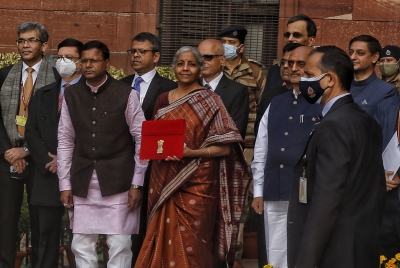Lower, middle and higher income groups tend to agree mostly on Budget
By IANS | Published: February 5, 2022 08:06 PM2022-02-05T20:06:06+5:302022-02-05T20:15:08+5:30
New Delhi, Feb 5 It is usually believed that different income groups, given their often vastly diverse economic ...

Lower, middle and higher income groups tend to agree mostly on Budget
New Delhi, Feb 5 It is usually believed that different income groups, given their often vastly diverse economic circumstances, tend to have conflicting reactions to Budget proposals.
But a nationwide -CVoter Post Budget survey shows a remarkable conformity and unanimity among various income groups when it comes to reactions to various Budget proposals and their opinions on the economy.
There are some differences, of course, but far less than normally expected. This applies to both positive and negative reactions.
For example, when asked if the current Budget was pro-poor, 45.6 per cent of lower income group said not at all, while 50 per cent of the higher income group echoed the same sentiment. The middle-income group was the most strident with about 57 per cent saying not at all. That was negative.
There was seeming unanimity even in positive responses. When asked if the latest Budget will strengthen the economy, 31.9 per cent said yes to a large extent, while 34.1 per cent of the higher income group held the same view. In the middle-income group, just about 25 per cent said yes to a large extent.
When asked what they thought of the proposal to build 80 lakh new houses under the PM Awas Yojana, 51 per cent of the lower-income group called it a very good decision while about 56 per cent of the middle-income group also said the same. Surprisingly, 60 per cent of the higher income group agreed with them.
There were differences too, along expected lines. The most significant related to (un)employment. When asked if the Budget will boost employment, 62 per cent of lower-income respondents disagreed while an even larger 64.5 per cent of middle-income respondents disagreed.
The figure was a shade above 50 per cent for higher income groups. But it should be noted that a majority of higher income groups don't see any immediate boost in employment.
Disclaimer: This post has been auto-published from an agency feed without any modifications to the text and has not been reviewed by an editor
Open in app